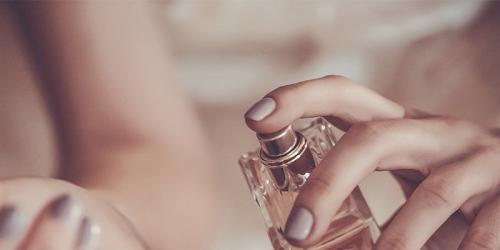"My mother was wearing a Diptych perfume, which she mixed with solar amber," recalls Elisa, "and it does not exist anywhere else, and that smell is all my childhood. Then, when she found him, she could not stand the scent any more, I beseeched her, she stopped wearing it. I feel like I've lost something. Since then, when I go to Diptyque, I sometimes shoot myself ... it's a very reassuring thing that catches up with me.
What is this "trick" that catches us up, that attaches us so strongly to the fragrance of our mother?
The omnipresence of the mother through the perfume
A few months ago, MC published a series of interviews on the relationship between mother and daughter.
When young women were asked to quote a strong recollection of the femininity left by their mother, they answered in astonishing proportion: "Her perfume." No need to say more.
In perfume there is everything: the warmth of presence, the enigma of femininity, the preciousness of childhood and the time that has passed. Women transmit gestures, intent, pure intangible. And in each of these stories, as in that of Elisa recounting the perfume of her mother and her lost smell - why? she will say no more - there is a whole novel.
"There is something immutable in the perfume"
This novel, Jean-Claude Ellena, who created Hermes perfumes since 2004, knows it well:
The strength of perfume is to make present the absent person.
"Much more than clothes, which are subject to fashions.There is something immutable in perfume.This is perhaps less true today, but a woman tended to wear the same perfume during all her life, and the perfume is linked to happy moments, that is to say: I shared this bathroom, she kissed me, went to the cinema together, I saw her in a beautiful toilette ... There is that behind it: a happy femininity, I do not know any perfume that evokes death. "
It is one of the first things that comes to him in conversation: "At the moment of death, the most difficult thing is to remove the things from the closet, because, by the smell, the person is very present."
Presence and absence: the perfume of the mother contains in itself years of feelings, a whole life as a child of its mother.
An odor unique to each mother and child
The quality of the perfume itself seems to count little in this story. This is the case for Hadrien, 30:
I do not ask myself if it's a good fragrance, it's Mom's smell that's it.
In the same siblings, several perfumes can successively play the role of the Proustian madeleine.
For Alexandrine, the perfume of the mother is Samsara de Guerlain, bar. For Laura, who is ten years older, Diorissimo is equally indisputable: "My mother may have had several perfumes, but for me the only one that counts is the one she wore at a specific moment in my life. childhood, maybe when I started looking at her both as a mother and as a woman. "
From the Proustian idyll to the Oedipus
The Oedipus passes through the effluvium Mother and woman, woman and mother: and if it was the nerve of war? Jean-Claude Ellena remembers: "When my mother perfumed herself - she had carried Madame Rochas for a very long time - I thought she was creating a distance, she was no longer quite my mother, she was becoming another person being my mother, I thought it was weird. "
And if the perfume just pointed out this bizarre boundary between what belongs to the mother and what escapes her, glimpsed at the embalmed kiss of the evening, before she goes to live her other life, nocturnal, sexual -be ? For perfume is not only a Proustian idyll. It also swims in full oedipus.
Jasmine Petiot, Vice President of the French Federation of Selective Perfumery, has been advising clients in her perfumery for more than thirty years:
I observe that few young women offer perfume to their mother.
"It's the boys who do it, while the girls buy the fragrance of their father more often," she adds.
First hypothesis: before 40 years, a woman can not afford to buy her own perfume and buy her mother's. It's she or me, no gift. Second hypothesis: 40 years is the age of reconciliation with his mother. Perhaps because one has become one of them or has renounced it.
A way to "linger" by the perfume
Jasmine Petiot, too, heard clients, before leaving, ask to smell their mother's scent, "to remember."
"They want to talk about it, they are moments of emotion."
On the Internet, we even meet bloggers who, pregnant, debate the new perfume they adopt at the birth of the baby, already projected in the memory they leave to their child. "Eternity through perfume", adds Jean-Claude Ellena.
From "Shalimar" to "J'adore": the flavors of Mother's Day
Chanel N ° 5 remains at the forefront of these everyday perfumes, whose sales take off at the time of Mother's Day. "In the business, we talk about" little Christmas ", explains Jasmine Petiot, it is virtually equivalent in terms of sales. Other perfumes offered to the ribambelles of mothers: L'Heure Bleue and Shalimar, by Guerlain, as well as Miss Dior and Diorissimo, by Dior Paris, Paris by Yves Saint Laurent.
Opium by Yves Saint Laurent? "Harder," she replies, "unless she has been wearing it forever." A perfume to offer to his mistress rather than to his mother, blows someone behind the scenes. They are rather floral fragrances "aldehydes", which express a classic femininity - neither amber, nor musk (halt to the sexual scandal), nor wooded (not too much virility either).
Three recent perfumes, J'adore, by Dior, La vie est belle and Trésor, by Lancôme, have also conquered their place amid ancient perfumes.
All three incarnated by mature women, in any case plausible in the role of mother.
Arpège de Lanvin occupies a unique place in this collection of statutory bottles: "It is only sold on Mother's Day," says Jasmine Petiot. Ironically: this perfume was created by Jeanne Lanvin in 1927, for the 30 years of his daughter, Marguerite. On the bottle, a mother welcomes her daughter into her huge skirts. From mother to daughter, then from daughter to mother, identities become blurred, the loop is closed. But how to get out?
Perfume as a point of contact between mother and daughter
Because between mother and daughter, "hainamour" is watching, as the psychoanalyst Jacques Lacan would say. His disciple Mary Magdalene Lessana published on the subject and a piquant book light 1.
"The mother-daughter logic does not have the same elements of algebra as the father-son relationship, which is always in comparison, measurement, rivalry in calibrated terms," she explains. Between mother and daughter, it is rather a grip, which it calls "rapture", in the double sense of wonder and dispossession.
There is rivalry between mother and daughter, of course, but the feminine is first of all a question that a little girl addresses to her mother.
"The little girls are attracted by the mother, they look at her with a look of envy, imitation, the perfume is the halo, the zone of contact, and it is part of the ritual of makeup, earrings, all this masquerade of the feminine that is so fascinating for little girls. Being attractive: it is a destiny that has something magical, mysterious and feeds tales.
But to free oneself from the fascination of the mother, one must go through the "ravage": "The day when it will be a question of becoming a woman in turn, not only to admire but to desire, there will be a crisis. A crisis of skin, of femininity, a crisis of bathroom, of mirror ... We must then eclipse the other, extinguish its flame, mark its difference. "
Build your own identity around a fragrance
After having "played" to wear perfume, the girl chooses a "true", well to her, well she - like Mom, but not the same as Mom. Subtle game of election: same perfumer, same type of smell? Question of territory. Difficult, in any case, to wear a perfume that the mother did not knuckle. "I do not recognize you" is a delicate sentence to hear - you should completely give up being a little girl.
Louise found a radical solution: she never wore perfume and hates that of her mother. "I think it 's all too much, I never wear it, it' s like jewelry and make - up, I refused everything, but I get along very well with her, I do not want to look like him. "
At a time when everyone is perfuming, not doing it is a very safe - and very demanding - way to stand out.
For it is the function of perfume: to distinguish oneself.
A history of social codes and femininity locked in a bottle
In "Le miasme et la jonquille", 2 , a cult, scholarly and delightful book published thirty-four years ago, and which inspired Patrick Süskind with his novel "Le parfum" 3 , the historian Alain Corbin retraces the genealogy of smell and the evolution of perfume in social codes.
Under the Ancien Régime, it is a dear and powerful product, reserved for the aristocracy, which serves above all to mask the corporeal odors - of man as well as of woman. With the advent of the bourgeoisie and the progress of hygiene, it is integrated into an "erotic science of modesty".
The perfume is no longer mask, it is revealing: it is light, flowery, it emphasizes cleanliness and personality. We must approach to feel it.
At the same time, the border is redrawing between the sexes. Man renounces strong perfumes, no longer weeps in public and dresses in black. To him the social sphere, to it the sensibility and the domesticity.
The sacred wife forbids amber, musk, civet, oriflammes of the prostitute. She becomes "woman flower", feminine but not female, sensual but not sexual. "This is the time when Houbigant and high perfumery are born," stresses Alain Corbin. The girl, on the other hand, does not perfume.
That would spoil her wonderful natural virgin odor. All the elements of a "new olfactory regime" under which we still live.
"There was, in 1968, a break, proclaimed, the historian observes, a struggle against deodorization and to let the body smells express itself, but was it realized ... I do not believe it ... "
The fragrance of the mother: quintessence of social code, well-conditioned femininity in a small bottle, a happy consumption program transmitted from generation to generation. And in this memory, in which every one believes he speaks of the very intimate, he reads, in fact, a great bourgeois novel in which he is, as always, a question of inheritance, reproduction, individualism and emancipation, its most beautiful scenes, the mother spends with a little time in the pure state.
1 " Between mother and daughter: a ravage" Ed. Hachette Pluriel.
2 "The miasme and the daffodil" Ed. Flammarion, History Fields.
3 "The perfume" Ed. The Pocket Book.




